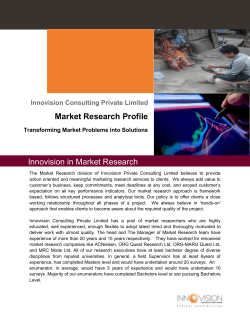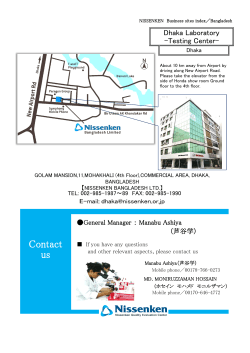
When Less is More
NEWSLETTER OF INNOVISION When Less is More Local hatchery pioneers improved technology for controlled stock and better benefits in Tilapia culture At both the farmers' and consumers' end, the Tilapia has gained a rising attention in the country since the Bangladesh Fisheries Research Institute (BFRI) imported Genetically Improved Farmed Tilapia (GIFT) from the Philippines and developed its strain in 1984. It is now one of the most popular cultured fishes in Bangladesh due to its high growth, stable market price and higher and quicker return on investment. However, the culture of mixed-sex Tilapia results in unwanted reproduction which reduces profitability due to loss of a significant part of harvest from unmarketable juvenile fish, overcrowding and undersized growth. To overcome this problem, BFRI popularized a technology to produce sex reversal mono-sex Tilapia seed, which involves reversal of sexually undifferentiated fry to males through feeding of masculine hormone. In supplement of the progression, it became important to develop the brood strain of YY Female Tilapia, too. To facilitate a steadfast reproduction rate and healthier yield of Tilapia, Innovision Consulting Private Limited signed a contract to work as the strategic partner with Abrar Hatchery, a thriving local enterprise in aquaculture, for developing the strains of both YY male and female brood Tilapia in Bangladesh. Dr. Rafiqul Islam Sarder of Bangladesh Agricultural University was called on as the research coordinator for this program while Johirul Islam, a PhD student, has been working as researcher. Abrar Hatchery, within its emerging facilities, has also kicked off the 'cryopreservation' - a scientific technique of keeping the fish-sperm intact for long period, even for several decades, aiding to alleviate the drastic decline in wild fish populations. Moreover, the cryopreservation increases the streamline of efficient aquaculture by ensuring continued supply of fresh YY Tilapia strains - broods and fries - at farmers' level. These activities have been designed, monitored and supported by Innovision under the project titled 'Stimulating Growth in Culture of Tilapia, Pangus & Koi and Promoting their Forward Market Access', commissioned by Katalyst, implemented by Swisscontact and GIZ IS (funded by DfID, SDC, CIDA and the Embassy of the Kingdom of Netherlands). Stimulating Demand for Capacity Development in Furniture Industry The small and medium enterprises in the furniture sector hardly realized that they could potentially recruit graduates of industrial and production engineering (IPE) to improve their manufacturing process and product quality. On the other hand, the IPE graduates or engineers seldom recognized the furniture industry as their prospective career destination. In this divergent situation, seeing the bright scopes in strengthening of academia-industry collaboration, Innovision recently partnered up with the Shahjalal University of Science and Technology (SUST) to develop a pool of production engineers specialized in furniture manufacturing technology. These engineering graduates were placed at internship programs at different furniture manufacturing facilities, where their scientific approaches, marketorientation, management skills and innovative ideas were greatly appreciated. Once the interns left, manufacturers started to realize how trained graduates could considerably improve their business. Many actually started to seek fresh engineering graduates, ultimately resulting in the development of a complete technical training-module on furniture manufacturing. Innovision hasn't stopped there. In association with Bangladesh Furniture Industry Owners Association (BAFIOA), it facilitated skill development training for carpentry households at Sutrapur, Badda, Bolirhat and Bogra - four of the largest furniture clusters in the country. The training program, so far, covered a staggering 3693 carpenters - discussing better furniture manufacturing technique in detail. BAFIOA took intervention forward in terms of arranging such programs in other clusters. The Technical Training Center (TTC) working under Ministry of Manpower, Employment and Training, will provide the required training programs for the carpenters through 32 training centers. Innovision has been managing the intervention under the M4P project titled 'Furniture Industry Development Project', commissioned by Katalyst, implemented by Swisscontact and GIZ IS. Doorway for Furniture Export Opportunities revealed for Bangladeshi Furniture Manufacturers in the market of India, Oman, Qatar and UAE Bangladesh's arts and crafts have been long known for their aesthetics. That combined with global standard manufacturing has taken our furniture industry to new heights. A trade delegation, under the arrangement of Bangladesh Furniture and Interior Décor Expo 2012, traveled to India, Oman, Qatar and UAE to showcase Bangladeshi excellence in furniture. They met around 200 large furniture importers and businessmen of these countries in a number of seminars arranged in Bengaluru, Muscat, Ruwi, Doha, Abu Dhabi, Sharjah and Dubai. The delegation also had a significant number of one-to-one meetings with the local furniture businessmen. The tour was hosted by Export Promotion Bureau of Bangladesh, organized by Bangladesh Furniture Exporters Association and facilitated by Innovision Consulting Private Limited. Other quarters included Jute Diversification Promotion Center, Ministry of Textiles and Jute, Akhtar furnishers, Furnitec, Hatil Complex, Otobi, Navana, Partex, Decor Idee, Banglacraft and Bangladesh Jute Diversified Product Manufacturers and Exporters Association. National Daily Focuses on Innovision's Success The Daily Star recently featured the case of Amir Hossain, a farmer from Dinajpur, who's really making the best of tricho-compost. With the guided support from Innovision, Amir was both producing and using the compost to secure higher profits. Use of organic fertilizer was helping his lands better retain nutrition too - a practice that the newsfeature recommended. The application and production of balanced fertilizers including tricho-compost are being promoted by different interventions of Innovision. The news link is given here http://www.thedailystar.net/suppliments/2012/anniversary_2012/section1/31.htm Adding Value to Value Chains Innovision organized Training on VCD A value chain refers to points through which raw materials become finished products. For a loaf, it can entail wheat production, grinding, transport and baking. Value chain development (VCD) addresses major constraints and opportunities at each of these points - helping farmers and producers, processors, traders and other businesses at multiple levels. Thus, value chain development aims to improve access to markets and increase efficiency. Innovision, a long-time proponent and facilitator of VCD interventions, organized a training program on 'Value Chain Development - Analysis, Program Design and Facilitation', held from March 11 to 15, 2012. As Lead Trainer, in flew from the Netherlands, Hans Posthumus. Hans, a 25-year veteran, has pioneered value chain development as early as 2001 at a time when value chain development was hardly recognized in pro-poor economic development. Also conducting sessions was Rubaiyath Sarwar, Managing Director of Innovision. Experts, consultants and officials from IRRI-CSISA, CIMMYT Bangladesh, HELVETUS Swisscontact, SwisscontactKatalyst and M4C-Swisscontact (SARO) Bangladesh took part in the training. Participants gained a better understanding of how to analyze market trends and industry dynamics, identify providers of marketbased solutions and determine their capacity for providing commercially viable support. Value chain mapping, dimensions of interest, economic analyses of value chains, critical success factors, value chain facilitation principles and good practices in project design are just some of the topics covered. Participants, at the end of the course, showed their confidence in understanding the position of VCD; they could analyze and visualize value chain dynamics, skillfully identify constraints and opportunities, develop selection criteria and design leveraged and holistic interventions. Now that's adding value! Innovision assessed Impacts on Small Farmers and Rural Producers Innovision recently conducted an assessment to measure the pragmatic changes in poor and rural communities in four districts of Bangladesh under 'Making Market Works for Small-holder Farmers and Rural Producers in Bangladesh', a five-year project implemented by Practical Action Bangladesh and funded by the EU. The objective of the project was to increase the income and employment opportunities from production, market and trade in farm and non-farm activities for similar communities of Dinajpur, Gaibandha, Magura and Faridpur districts in Bangladesh. The project selected dairy, beef and pottery as the most promising subsectors to help smallholder farmers challenge poverty. It also reached 800 vulnerable women engaged in nonfarm activities. A total of 280 respondents were investigated through the impact assessment study. The purpose of this research was to assess the impact of project interventions over the different producer groups and other stakeholders. The assessment measured the change in demographic features, change in financial and market status, business services received by the producers and provided by the service providers, support from the project, status of gender issues and change in livelihoods. Revitalizing Tea Finding Sustainable Scopes for Small Tea Growers After water, tea is the most popular drink in the world. While tea gives us stamina, for millions of workers and farmers, it is a source of livelihood. In Bangladesh and India, Traidcraft Exchange implements ‘Sustainable Livelihoods for Small Tea Growers’, a joint project funded by European Union. It aims to bring about enduring improvements to the lives of small tea-growers - through helping boost incomes and realize fairer terms of trade. The project is working with 1000 small and marginal farmers at Tentulia, Panchagarh area in Bangladesh part. Innovision recently completed a baseline study for this project, covering small tea growers’ demographic profile, household condition, access to health care and loan facilities etc. The investigation also explored the potential interventions with prospective growers. The study observed diverse agricultural practices, while lack of appropriate knowledge on tea growing was found to be the major growth obstacle. Such work will function as a foundation for strong, meaningful and sustained interventions with small tea-growers. Study on Fish Seed Value Chain in the Southern Region Fish from the Southern Coast is a key pillar of food security in Bangladesh. Yet the region is also the most poverty-stricken area. Clearly there had to be a breakdown in the value delivery mechanism. The 'Aquaculture for Income and Nutrition' (AIN) project, implemented by World Fish and funded by USAID, aims at increasing production in 20 Southern districts. The expansion of adaptive small-scale aquaculture is a significant way to provide employment for the poor, help achieve food security and reduce malnutrition. As a part of AIN project, Innovision conducted the value chain assessment on the market of carp fish seed (spawn, fry and fingerlings) in southern regions. With active responses from hatcheries, nurseries, grow-out farmers, trade intermediaries and key informants, this assessment obtained a clearer understanding of the volumes of fish (produced and consumed), their origin (by system and location) and their destination (by type of market, type of consumer and location). The study assessed the market potential for fish seeds, production and distribution systems and competitiveness of the market. Innovision also analyzed the constraints in market systems and recommended market based solutions. Yields From Fertilizer Publication Dr. Syeda Zinia Rashid of Innovision's fertilizer team recently shared her publication 'Composting and Use of Compost for Organic Agriculture in Bangladesh', which was published in the Proceedings of the 4th International Conference for the Development of Integrated Pest Management in Asia and Africa (20-22 January 2011). The work includes issues related to regeneration of soil fertility, balanced fertilization, necessity of organic agriculture and experiences from the project 'Market Development in the Fertilizer Sector of Bangladesh'. The paper can be viewed online at the given link http://www.innovision-bd.com/Files/Proceedings_4th_Int._IPM_Conference_Zinia.pdf VISION is a quarterly newsletter by Innovision Consulting Private Limited. All the content published and circulated are treated as intellectual property of Innovision. Suggestions and comments for improvement of this publication are very encouraged. To know about Innovision and its activities please visit www.innovision-bd.com or write to info@innovision-bd.com.
© Copyright 2025









